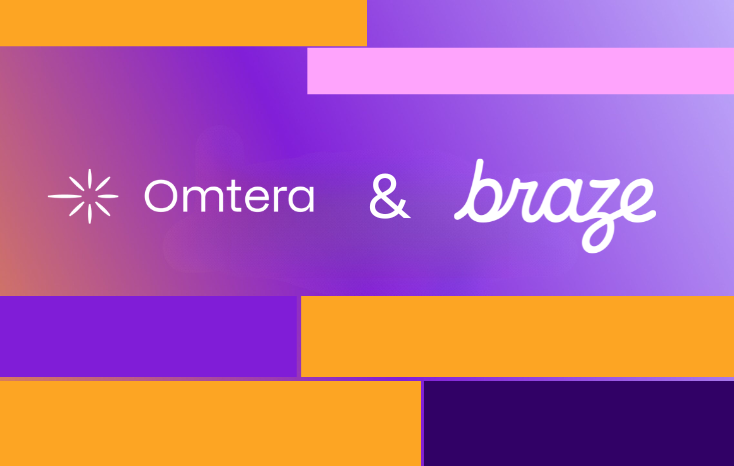
In today’s digital marketing world, customer engagement is no longer just about sending campaigns; it means delivering personalized, real-time experiences tailored to each user’s behavior.
At this point, two powerful tools stand out: Braze and Netcore Cloud.
So which one truly meets the needs of modern marketing teams?
In this guide, we will examine step by step why Braze provides a more scalable, data-driven, and user-centric solution.
As an official Braze Solution Partner, Omtera draws from its experience to explain the technical and strategic differences between these two platforms.
1. Customer Engagement Approach: Braze’s Real-Time Power
Braze builds customer engagement on real-time data streaming.
When a user performs an action within your app, Braze detects it within milliseconds and automatically triggers the appropriate response — for example, sending a personalized push notification to a user who has abandoned their cart within minutes.
Netcore Cloud, on the other hand, mainly adopts a batch-based marketing approach. This means designing campaigns based on historical data.
This model is not as agile as Braze in responding to fast-changing customer behaviors.
✅ Braze advantages:
- Event-based triggering
- Real-time processing capability
- Instant action based on user behavior
2. Personalization and Artificial Intelligence (AI) Capabilities
Braze’s AI-powered personalization engine analyzes users’ past interactions, preferences, and behavior patterns to optimize the content, timing, and channel of each message.
For example, Braze’s Intelligence Suite automatically learns and applies the most effective time to send an email or push notification for higher conversion rates.
Netcore Cloud also offers personalization features, but its AI models are mostly limited to predictive segmentation.
In other words, it cannot achieve dynamic content adaptation and real-time prediction at the same level as Braze.
✅ Braze advantages:
- AI-powered timing (Intelligent Timing)
- Dynamic content personalization
- Predictive engagement recommendations
3. Data Integration and Ecosystem Compatibility
Today, a brand’s success depends on how well its marketing platform integrates with other systems.
Braze offers native integrations with leading data and CRM tools such as Segment, Snowflake, Salesforce, Amplitude, and Mixpanel.
This allows brands to manage the customer journey end to end within a single data ecosystem.
Netcore Cloud provides fewer integration options and generally requires manual API connections, which extend setup time and increase maintenance costs.
✅ Braze advantages:
- 100+ native integrations
- Compatibility with Segment, Snowflake, Salesforce
- Real-time data synchronization
4. Campaign Management and Automation
Braze’s Canvas Flow interface enables marketing teams to easily visualize complex customer journeys.
This drag-and-drop structure allows both technical teams and marketers to collaborate on the same platform.
Netcore Cloud’s campaign flow also provides visualization, but it lacks the real-time optimization capabilities that Braze offers.
For example, Braze Canvas tracks whether an email sent to a user has been opened in real time and automatically adjusts the next step accordingly.
✅ Braze advantages:
- Real-time flow optimization
- Visual campaign management
- Channel-based conversion tracking
5. Scalability and Performance
Braze is built on an architecture capable of processing data for hundreds of millions of users globally at once.
Its cloud-native infrastructure ensures that your campaigns scale without sacrificing performance.
Netcore Cloud, however, may encounter delays and data processing limits in high-volume operations.
This difference becomes particularly evident in sectors such as e-commerce, finance, retail, and mobile apps.
✅ Braze advantages:
- High processing capacity
- Global CDN infrastructure
- Fast scalability
6. Reporting and Analytics
Braze’s Analytics Dashboards module allows campaign performance to be tracked using both real-time and historical data.
Engagement rates, conversion funnels, channel performance, and segment-based analyses can all be visualized on a single dashboard.
Netcore Cloud also includes analytics tools, but its customizable reporting and BI integrations are not as advanced as Braze’s.
✅ Braze advantages:
- In-depth analytics dashboards
- KPI-based customization
- Integration with Snowflake and Tableau
7. Security, Compliance, and Support
Braze fully complies with international security standards such as GDPR, CCPA, and ISO 27001.
Additionally, the platform ensures that user data is stored and transmitted in encrypted form.
Through Omtera’s Braze partnership, brands can progress with end-to-end consultancy — from implementation to training and optimization.
✅ Braze advantages with Omtera support:
- Secure data management
- Compliance assurance
- Local support and technical training
8. Pricing and Total Cost of Ownership (TCO)
Netcore Cloud may appear more affordable at the entry level; however, as scale increases, manual processes and limited integrations cause the Total Cost of Ownership (TCO) to rise.
Braze may seem slightly higher in initial investment, but thanks to automation, speed, and efficiency, it delivers lower overall operational costs.
✅ Braze advantages:
- Lower long-term costs
- ROI focused on efficiency
- Fast return on investment
Comparison Summary: Why Braze Leads
The Right Choice for Scalable Engagement: Braze
In today’s digital world, user behavior changes every second.
Real-time data, AI-powered personalization, and robust integration capabilities have become the key to gaining a competitive edge.
That’s why Braze is not just a customer engagement platform — it is a growth engine for brands.
With Omtera’s Braze expertise, brands:
- Unify their data in one central hub,
- Automate their campaigns,
- Reach each user at the right moment, and
- Maximize their marketing ROI.
Looking to strengthen real-time, data-driven customer engagement? Get in touch with Omtera today and let’s discover how we can optimize the Braze platform for your brand.
Frequently Asked Questions (FAQ)
1. Which types of businesses is Braze best suited for?
Braze is ideal for e-commerce, fintech, retail, mobile app, and SaaS companies operating at medium to large scale.
2. Is it difficult to migrate from Netcore Cloud to Braze?
No. With Omtera’s Braze partnership, data migration, user scenario rebuilding, and training processes are fully managed.
3. What are Braze’s AI features?
Braze AI optimizes message timing, channel preferences, and content types — ensuring that every user receives the right message at the right time.
.webp)



.svg)